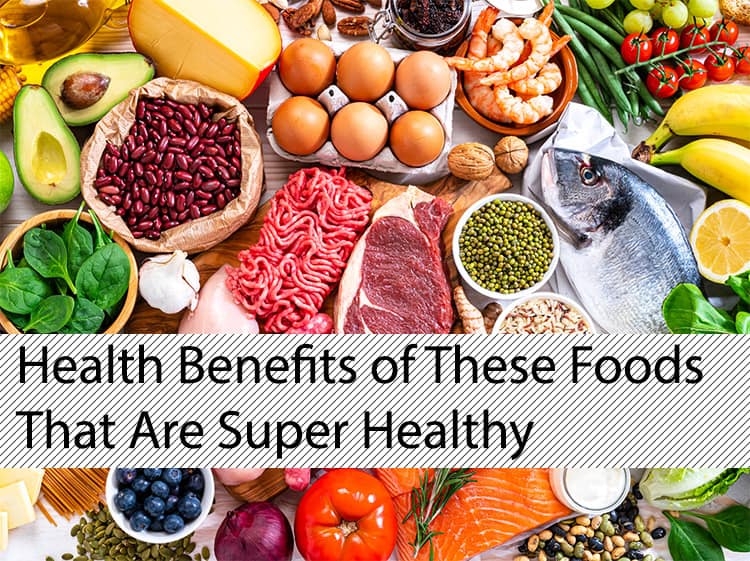The healthiest diets focus on real food – vegetables, fruits, whole grains, healthy fats and proteins – and limit sodium. You can eat superfoods like bananas, beets, lentils, and lentil soup. Most of these are also readily available and delicious. Let’s take a look at the health benefits of each. It’s easy to see why these foods are so beneficial.

Veggies
You might not realize it, but vegetables are packed with nutrients. They contain vitamins and minerals, which help your body maintain a healthy balance of hormones. They also support immune system health, help you lose weight, and strengthen skin, hair, and nails. Many studies show the health benefits of increasing your veggie intake, such as decreased risk of chronic diseases and lifestyle-related cancers. Observational data also links adequate intake of fruits and vegetables to improved moods and self-reported happiness.
In addition to their antioxidant benefits, many vegetables are high in fiber and starch. Consuming a variety of vegetables can lead to the best possible health outcomes. Each vegetable contains its own unique health benefits. It is important to include them in a balanced diet for maximum health benefits. Here are five vegetables that pack the best punch:
Veggies are a great source of fiber, and fiber can help keep your bowels regular. A low-carb diet can lead to constipation, but vegetables are high in fiber, which keeps the bowels healthy and active. You can count fiber grams and subtract them from the carb content to determine net carbohydrates. Eating vegetables can boost your health, regardless of carb count. There is no such thing as too many vegetables.
Fruits
Many foods are labelled superfoods and they are loaded with vitamins, minerals, and antioxidants. Superfruits can also prevent certain diseases and are great sources of fiber. Apples, for example, contain a high level of the antioxidant quercetin which can help protect the heart from heart disease and can help prevent allergies. However, there are also certain types of superfruits that are less commonly known but are still packed with health benefits.
Watermelons contain a high level of vitamin C and the rare antioxidant lycopene, which is linked with lowering heart disease risk. In addition to this, tomatoes contain high levels of fiber and potassium. They’re also low in calories. Another fruit that has many health benefits is papaya, a tropical fruit full of vitamin C. Its high levels of vitamins A and E may help protect against colon and heart disease.
Bananas may have started the whole superfood movement. Bananas were first designated as a superfood by the Harvard T.H. Chan School of Public Health, which published research on the benefits of bananas. Ninety years later, bananas are among the top three most popular imported fruits in the U.S. Today, bananas are still considered superfoods. A banana, for instance, contains more antioxidants than any other fruit!
Whole grains
Many health benefits of whole grains are due to their high fiber content and important vitamins and minerals. Fiber, particularly soluble fiber, promotes regular bowel movements and may help prevent colon problems like diverticulosis. Whole grains may even prevent the onset of certain types of cancer. And because they’re packed with fiber, whole grains may help lower cholesterol levels. In addition, they may also boost your immune system. And if you don’t think whole grains are worth eating, consider these additional benefits.
Compared to refined grains, whole grains are more nutritious. They contain the whole grain kernel, not just the bran and germ. Refined grains don’t have this important component. Whole grains must be listed as one of the first three ingredients on the label. Look for a stamp from the Whole Wheat Council indicating that at least half of the serving contains this type of grain. Look for “white” versions of whole grains if your kids are hesitant to try them.
The bran layer in whole grains is full of important nutrients, including vitamins and minerals. These nutrients are found in whole grains, and many studies have linked them to lower the risk of several chronic diseases. While a link was not found between eating whole grains and cancer, current research suggests that a diet rich in whole grains can decrease the risk of colorectal cancer. And while more research is needed to prove this link, whole grains are definitely worth trying.
Yogurt
You may have heard of the benefits of yogurt, but have you ever wondered how it can help you lose weight? Yogurt contains protein and other vital nutrients that your body needs. But many brands have added sugar, stabilizers, and other artificial ingredients. You can also choose super low-calorie brands that are high in sugar and low in protein. Go for Greek yogurt – it has fewer additives and more protein, and you’ll get more nutrition without the extra calories.
Yogurt has antibacterial properties. The bacteria in yogurt may help prevent Type 2 diabetes. Hence, consuming yogurt regularly may help prevent Type 2 diabetes. Its unique properties are also thought to influence the gut microbiota, which may help lower glycemic variability. But make sure to buy plain, unsweetened yogurt – no added sugar or sweeteners! Yogurt is also good for bone health.
Another major benefit of yogurt is that it contains probiotics. Probiotics are beneficial bacteria in the digestive system. Those bacteria can help your body fight infections and improve your digestive health. You should look for a brand that has a “Live & Active Cultures” seal to ensure that it contains probiotics. It may vary from brand to brand. The benefits of consuming yogurt are numerous. They include improved immune function, lower blood pressure, and healthy cholesterol levels. Finally, yogurt can help prevent long-term weight gain.
Fish
Fish is an amazing food source, and many of them are packed with protein. They are low in fat, yet high in omega-3 fatty acids and other essential nutrients. Salmon is one of the best fish to eat for the anti-inflammatory properties. Salmon is also known to be helpful for fighting depression. Depression is a silent killer and often goes undiagnosed. This infographic highlights seven superfoods for spoonies. Here’s what they have in common.
These nutrient-rich foods are high in antioxidants and can boost the immune system. They also lower inflammation and kill harmful bacteria. Overall good health is essential for happiness and success. And if you’re looking for the ultimate health boost, consider superfoods. They’re worth trying! Let’s discuss some of the healthiest foods to include in your diet. Listed below are some of the most delicious superfoods you can eat.
Dark leafy greens
You’ve probably heard about the health benefits of dark leafy greens, but if you’re still unsure of whether they’re good for you, consider eating them more often. Although the dark leafy greens in your typical salad are rich in antioxidants, they don’t taste very appealing. They are also difficult to get from a regular diet, so you may want to consider purchasing organic greens powder for convenience. Organic greens powder is a great way to get all the health benefits of leafy greens without the mess or hassle of cooking them.
In addition to being super healthy, dark leafy greens can help with conditions like leaky gut, food sensitivities, and autoimmunity. Cruciferous vegetables trigger the production of innate lymphoid cells, which regulate bowel function and fight against food allergies and infections. They can also promote weight management. People with type-2 diabetes may benefit most from eating dark leafy greens. They’re also good for the heart and can help with a variety of conditions, including arthritis.
In addition to being good for you, leafy greens also provide essential vitamins and minerals. You can eat at least three cups of leafy greens every week and see a difference in your diet. They contain high amounts of vitamin A, calcium, and magnesium, and help to prevent deficiency of vitamins A and C. They’re also good sources of fiber, folate, potassium, iron, and magnesium. They also contain a wide variety of other nutrients, including manganese, iron, potassium, and manganese.
Extra virgin olive oil
There are dozens, if not hundreds, of studies that show the heart benefits of extra virgin olive oil. It reduces blood pressure and oxidation of LDL cholesterol. Other studies show it may help prevent unwanted blood clotting and reduce inflammation. These are just a few of the many health benefits of olive oil. It is definitely worth adding to your diet! Read on to learn more about the benefits of olive oil.
A high concentration of polyphenols in EVOO may help fight off chronic diseases. Recent studies have shown that people who consume olive oil have lower cholesterol levels, higher moods, and stronger bones. It may also prevent some forms of cancer. But more importantly, it is packed with nutrients that are essential for optimal health. This article will explain more about the health benefits of extra virgin olive oil and how it can benefit you. You can also learn more about the many other health benefits of olive oil by reading on.
One of the most notable benefits of extra virgin olive oil is its ability to fight free radicals. Antioxidants inhibit the activity of harmful molecules in the body, which causes aging and other diseases. They help the body absorb nutrients and reduce the risks of heart disease. Olive oil is rich in monounsaturated fats, including oleic acid, which makes up 73% of the oil. And it contains beneficial amounts of vitamin E, which helps support the body’s many functions.


